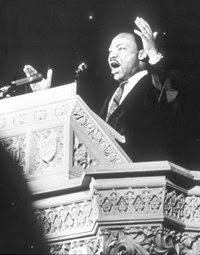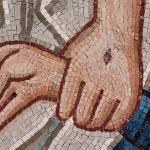 by Andre E. JohnsonR3 Editor
by Andre E. JohnsonR3 Editor
*Dr. Johnson presented a portion of this paper at the National Communication Association meeting in Washington, DC on November 21, 2013
On Palm Sunday, March 31, 1968, the Reverend Dr. Martin Luther King Jr. stood in the National Cathedral in Washington D.C. during Sunday worship service not as a civil rights leader, not as an anti-war protester, not as a philosopher, or any other label that people had thrust upon him at that time. King on that day stood as he had stood in Ebeneezer and Dexter Avenue Baptist churches. He stood as a pastor and as a Christian minister proclaiming the Gospel of Jesus Christ. His sermon title for the day was one he had preached several times before—“Remaining Awake Through a Great Revolution.”
In what would be King’s last time to deliver a Sunday sermon, this essay maintains that this sermon (text) illustrates and example of prophetic rhetoric. The essay will demonstrate this by offering a definition of prophetic rhetoric that explicates a four part rhetorical structure and by offering a close reading of the text; I will then analyze the sermon within this structure.
Martin Luther King’s sermon was an example of prophetic rhetoric because the appropriate response would have been to preach a lighthearted, Palm Sunday sermon, celebrating Jesus’ triumphal entry into Jerusalem. The sermon that King should have preached on this day would have been one of joy, happiness, worship, and adoration. In short, Palm Sunday sermons are pretty much standard in the repertoire of a seasoned preacher such as King and would have fitted nicely here.
Also it should be noted that after King’s experience in Memphis only three days before this sermon, his vilification in the newspapers throughout the country, and a rancorous meeting with his staffers only a day before, it would have been very temping for King, who scheduled this speaking engagement many months ahead, just to offer the “appropriate and fitting response.”However, King decides that the appropriate and fitting response is to offer a prophetic sermon—one that reminds his audience of its duties and responsibilities. Before analyzing the text as prophetic, we turn our attention to the term “prophetic rhetoric.”
In my book the Forgotten Prophet: Bishop HenryMcNeal Turner and the African American Prophetic Tradition, I offered a working definition of prophetic rhetoric. I defined it as
discourse grounded in the sacred and rooted in a community experience that offers a critique of existing communities and its traditions by charging, challenging, exposing, and encouraging society to live up to the ideals espoused while offering celebration and hope for a brighter future.
Drawing upon this definition of prophetic rhetoric, and placing it in the context of a given text, there are four elements that make up prophetic rhetoric. The speaker must ground the speech in the sacred, reveals or exposes what I call, the real present situation, offers a challenge, critique, charge, or judgment to the audience and finally offer encouragement and hope for a brighter future. Due to time constraints, I will only focus on two elements of prophetic discourse—grounded in the sacred and encouragement and hope.
Prophetic Rhetoric in “Remaining Awake Through a Great Revolution”
Grounded in the Sacred
Prophetic rhetoric grounds itself in what the speaker and community deems sacred. Since this is a Christian sermon that King delivered in a church on Sunday morning, and no less on a special day (Palm Sunday), the sacred that King used to ground his sermon is scripture. In good homiletical form, he announces the sermon text near the beginning of the sermon and refers to it again twice in the sermon.
However, how does the sacred function in the text? In order to make an appeal to the sacred, the speaker must be able to hold it up as a model to look at, aspire to, or for the audience to transform into, but then it must also point outward to a much larger picture. King’s uses of the sacred do just that.
First, King reads the text from what he says is Revelation chapter 16 “Behold I make all things new: f
ormer things are passed away”. First, however, the text he is alluding to is Revelation 21: 4-5 not Revelation 16. Second, the text in which these two passages derived actually reads, “and God shall wipe away all tears from their eyes; and there shall be no more death, neither sorrow, nor crying, neither shall there be any more pain: for the former things are passed away. And he that sat upon the throne said, Behold, I make all things new. And he said unto me, write: for these words are true and faithful” (KJV). The mistake King makes in saying that the text comes from Revelation 16 instead of Revelation 21 I attribute that to human error. However, in inverting the text; having “behold I make all things new” come first and then “former things are passed away” when it is actually the other way around, functions as a rhetorical strategy that he can build upon throughout the sermon.
Traditionally, preachers see Revelation 21 as an eschatological text that speaks of the end times. Tradition has it that the Roman government banished John, a disciple of Jesus Christ, on the island of Patmos for proclaiming the teachings of Jesus to a disbelieving public. It was here that he catches a “revelation of Jesus Christ,” which included a vision of a new heaven and a new earth. In this vision, God shall dwell with God’s people and God will wipe away all the tears from their eyes. There would be no more death, no more sorrow, no more crying, and no more pain. Thus, John could declare, “Former things are passed away.”
However, this could only happen because the one (God) who sits on the throne says, “Behold I make all things new.” What King does is offers God’s voice first by declaring, “behold I make all things new” and offers John’s voice last, “former things are passed away.” With this inversion of the text, King has done two things.
First, he has lifted a traditional eschatological text that spoke of the end times and placed it in contemporary society or in other words, he took the not yet and placed it in the right now. Therefore, King does not allow the text to stay on the pages of the Bible, but now the text becomes a living, breathing, and functioning word for his hearers today.
Second, by inverting the text, King can offer God’s voice first as the author of this change that takes place and he (King) can now replace John as prophet and declare, “Former things are passed away.” By adopting the persona of John, King now is the lonely prophet on the island of Patmos, banished to the margins, who hears God’s voice declaring, “Behold I make all things new” because he can see that the “former things are passed away.” King wants the “former things are passed away” to be last on the mind of his audience as a reminder because whenever something is new, the old or “former things” cannot hold sway. By grounding his sermon in this text, he declares that God is the author of the change he calls for later in the sermon. As prophet, he sees this and tries to prepare his audience/congregation for the changes because “former things are passed/passing away.”
By offering this type of interpretation of the text, King engages in what Barbara A. Holmes call griosh. Griosh, deriving from the word griot, which refers to the “African storytellers who were also historians and keepers of cultural memory” and the sound sh, which is the “symbolic marker of the hush arbors where Christian diasporian faith perspectives were honed,” is an African diasporian midrash that employs a “reading into the text (eisiegesis) instead of a literal reading (exegesis) of the text. As Holmes notes this becomes a “cultural resource that restores human-divine dialogue, reassuring a captive community that God is still in control and that God has not forsaken them even during the worst of circumstances” (120) and for King, everyone is part of a captive community in need of liberation.
Offering Encouragement and Hope
The final part of the prophetic rhetorical structure is the offer of encouragement and hope. To offer a complete analysis of what I consider prophetic hope is beyond this essay here. However, I will touch on the two main categories of prophetic hope.
The first type of prophetic hope is an eschatological hope. It is a hope in the afterlife that all pains and sorrow will be gone. It would have been logical to use this type of hope to conclude his sermon because King grounded the sermon in Revelation 21, which is an eschatological text. The text speaks of a day when there will be a new heaven and a new earth and of course, this day has not yet arrived.
King however, takes a different approach. The hope he professes is more of an earthly hope. It is a pragmatic type of hope rooted in his faith in God. Cornel West, in his book Democracy Matters, calls this type of hope a “tragicomic hope” propelled by the African American experience found in the creation of the blues. About this experience and interpretation West writes
This black American interpretation of tragicomic hope is rooted in a love of freedom. It proceeds from a free inquisitive spirit that highlights imperial America’s weak will to racial justice. It is a sad yet sweet indictment of abusive power and blind greed run amok. It is a melancholic yet melioristic stance toward America’s denial of its terrors and horrors heaped on others. It yields a courage to hope for betterment against the odds
without a sense of revenge or resentment. It revels in a dark joy of freely thinking, acting, and loving under severe constraints of unfreedom.
Therefore, King can realistically look toward the future and say, “the cards are stacked against us.” It is a hope that knows that “this time we will really confront a Goliath,” the Goliaths of injustice, neglect, and refusing to deal with the problems.” However, it is through this tragicomic hope that King can forge ahead and help make “America the truly great America that it is called to be.”
There is another reason, however, for King’s optimism even as he battles what CornelWest calls “aggressive pessimism.” King can draw on his forbearers who were here before the Pilgrim Fathers, before the Declaration and the “Star Spangled Banner.” King now stands against his audience by invoking the memory of his forbearers.
For more than two centuries our forbearers labored here without wages. They made cotton king, and they built the homes of their masters in the midst of the most humiliating and oppressive conditions. And yet out of a bottomless vitality they continued to grow and develop. If the inexpressible cruelties of slavery couldn’t stop us, the opposition that we now face will surely fail.
Therefore, King could declare hope by saying
We’re going to win our freedom because both the sacred heritage of our nation and the eternal will of the almighty God are embodied in our echoing demands. And so, however dark it is, however deep the angry feelings are, and however violent explosions are, I can still sing “We Shall Overcome.”
For King, drawing from his forbearers and finding the power to move forward from their hope and resilience, he now can stay focused and no matter how “dark and deep feelings of angriness” are, he can still sing “We Shall Overcome.” However, he not only says this for himself. He includes the audience as well. He wants his audience not to despair. He wants his audience to participate in this movement by claiming the strength of his forbearers.
King also can proclaim hope because the cause is right. The reason why they are going to win their freedom is because the “sacred heritage of our nation and the eternal will of almighty God are embedded in our echoing demands.” What King says here is that he and the people who subscribe to this belief are not alone because the true essence of the nation and the will of God back up these demands.
To end the sermon, King uses one of his classical endings.
We shall overcome because the arc of the moral universe is long, but it bends toward justice. We shall overcome because Carlyle is right—”No lie can live forever.” We shall overcome because William Cullen Bryant is right—”Truth, crushed to earth, will rise again.” We shall overcome because James Russell Lowell is right—as we were singing earlier today, Truth forever on the scaffold, wrong forever on the throne. Yet that scaffold sways the future. And behind the dim unknown stands God, within the shadow keeping watch above his own.
As Sunnemark notes, this was one of King’s “most frequently used examples of literary argumentation.” Sunnemark writes that the “quotations form a proof that King’s arguments are based on righteousness. He infuses them with the truth of God’s moral universe and he gives the words almost biblical qualities.” However, something else is at work here. By incorporating these literary figures, King pulls them into the struggle as well. In short, these figures become harbingers of the struggle and they, through the voice of King, provide comfort, reassurance, encouragement and hope.
See West, Cornel. “The Prophetic Tradition in Afro-America” in Let Justice Roll: Prophetic Challenges in Religion, Politics, and Society. ed. Neal Riemer. Rowman and
Littlefield Publishers. Lanham, Maryland, 1996. 89-100
 by Andre E. Johnson
by Andre E. Johnson














